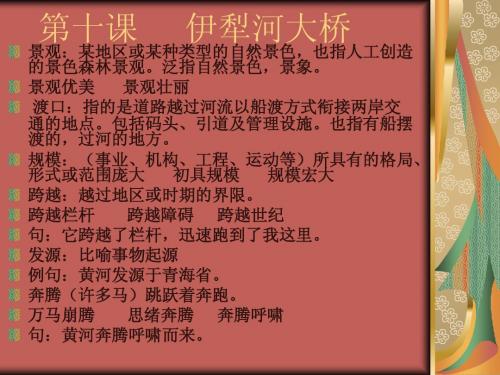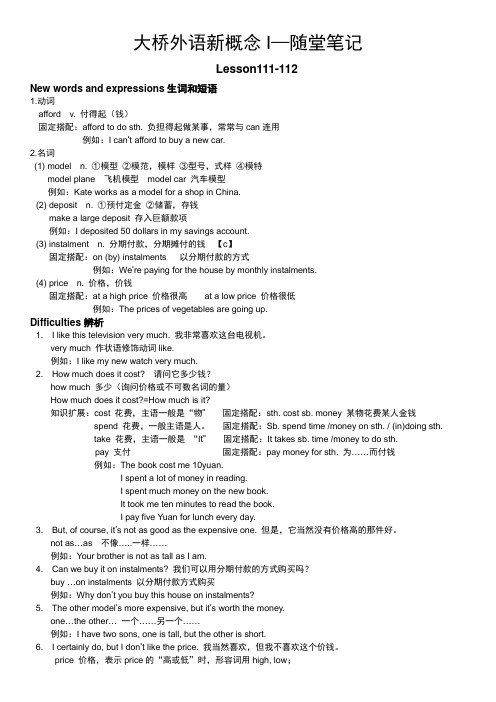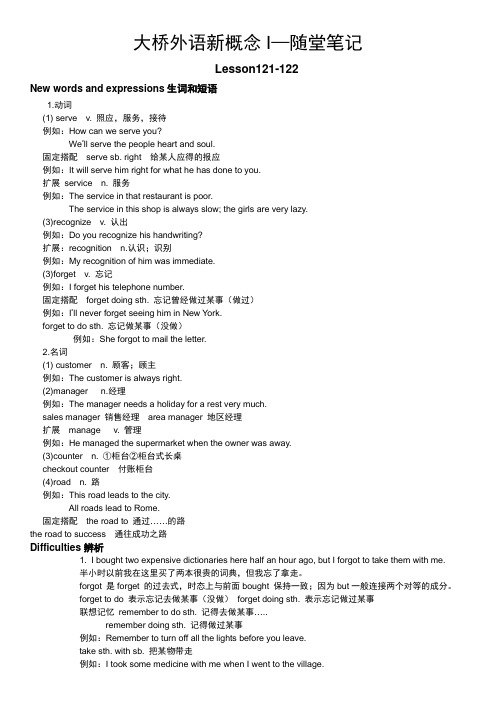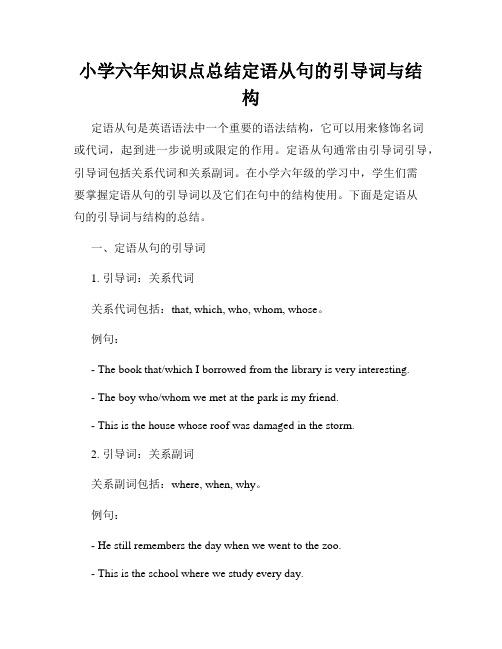引桥课程 词组及句型)
数学小初引桥课程(最终稿)

整数、小数、分数和百分数的认识1、二百零四亿零六十万零二十写作( )。
2、960074000用“亿”作单位写作( );用“亿”作单位再保留两位小数( )。
3、把73、83和74从小到大排列起来是( )。
4、0,1,54,208,4500都是( )数,也都是( )数。
5、把0.58万改写成以“一”为单位的数,写作( )。
6、把12.5先缩小到原来的101后,小数点再向右移动两位,结果是( )。
7、分数单位是111的最大真分数和最小假分数的和是( )。
8、在下面的□里中填上适当的数字,使第一个数最接近368万,第二个数最接近10亿 368□700≈368万 9□2600000≈10亿 9、()()()()===÷==÷16545.025.0( )%=( )成10、根据前面三个数的规律,写出后面那一个数来。
2345、3452、4523、( ) 11、找规律填数。
1、2、4、( )、16、( )、64 二、判断(对的打“√”,错的打“×”)1、比97小而比95大的分数,只有96一个数。
( )2、150120不能化成有限小数。
( )3、1米的54与4米的51同样长。
( ) 4、0.475保留两位小数约等于0.48。
( ) 5、4和0.25互为倒数。
( )6、去掉小数点后面的0,小数的大小不变。
( )7、5.095保留一位小数约是5.0。
( )8、甲数的21等于乙数的31,那么甲数大于乙数( )。
数的整除1、24和8,( )是( )的因数,( )是( )的倍数。
2、在1、2、3、9、24、41和51中,奇数是( ),偶数是( ),质数是( ),合数是( ),( )是奇数但不是质数,( )是偶数但不是合数。
3、21的所有因数是( ),21的全部质因数有( )4、一个合数的质因数是10以内所有的质数,这个合数是( )。
5、a=2×3×5 ,b=2×3×3,a、b 两数的最大公因数是( ),最小公倍数是( )。
八年级_双语__第十课____伊犁河大桥__词语

源远流长—— 长江是一条源远流长的大河。 中华文化源远流长。 琴声悠扬 歌声悠扬 句:他的琴声悠扬。
第十课
伊犁河大桥ห้องสมุดไป่ตู้
图案精致 图案鲜艳 作证:做证明,向司法机关提供证据,证言。 出庭作证 出面作证 句:我请他出面为我作证。 民俗:民间的风俗习惯。考察民俗 人文科学 人文景观 人文精神 人文关怀 遐想联翩 闭目遐想 句:我对未来有很美好的遐想。
浩浩荡荡:原形容水势广大的样子。后形容事物的 广阔壮大,或前进的人流声势浩大。 江水浩荡 烟波浩荡 春风浩荡 浩浩荡荡——游行队伍浩浩荡荡地通过天安门广场。 宜人:合人心意 风景宜人 气候宜人 句:这里的气候宜人,是个旅游的好地方。 美不胜收——展览会上的工艺品,琳琅满目,美 不胜收。 零零散散 句:教室里零零星星放着几张课桌。
大桥外语新概念I-随堂笔记111-112

大桥外语新概念I—随堂笔记Lesson111-112New words and expressions生词和短语1.动词afford v. 付得起(钱)固定搭配:afford to do sth. 负担得起做某事,常常与can连用例如:I can’t afford to buy a new car.2.名词(1) model n. ①模型②模范,模样③型号,式样④模特model plane 飞机模型model car 汽车模型例如:Kate works as a model for a shop in China.(2) deposit n. ①预付定金②储蓄,存钱make a large deposit 存入巨额款项例如:I deposited 50 dollars in my savings account.(3) instalment n. 分期付款,分期摊付的钱【c】固定搭配:on (by) instalments 以分期付款的方式例如:We’re paying for the house by monthly instalments.(4) price n. 价格,价钱固定搭配:at a high price 价格很高at a low price 价格很低例如:The prices of vegetables are going up.Difficulties辨析1. I like this television very much. 我非常喜欢这台电视机。
very much 作状语修饰动词like.例如:I like my new watch very much.2. How much does it cost? 请问它多少钱?how much 多少(询问价格或不可数名词的量)How much does it cost?=How much is it?知识扩展:cost 花费,主语一般是“物”固定搭配:sth. cost sb. money 某物花费某人金钱spend 花费,一般主语是人。
大桥外语新概念I-随堂笔记121-122

大桥外语新概念I—随堂笔记Lesson121-122New words and expressions生词和短语1.动词(1) serve v. 照应,服务,接待例如:How can we serve you?We’ll serve the people heart and soul.固定搭配serve sb. right 给某人应得的报应例如:It will serve him right for what he has done to you.扩展service n. 服务例如:The service in that restaurant is poor.The service in this shop is always slow; the girls are very lazy.(3)recognize v. 认出例如:Do you recognize his handwriting?扩展:recognition n.认识;识别例如:My recognition of him was immediate.(3)forget v. 忘记例如:I forget his telephone number.固定搭配forget doing sth. 忘记曾经做过某事(做过)例如:I’ll never forget seeing him in New York.forget to do sth. 忘记做某事(没做)例如:She forgot to mail the letter.2.名词(1) customer n. 顾客;顾主例如:The customer is always right.(2)manager n.经理例如:The manager needs a holiday for a rest very much.sales manager 销售经理area manager 地区经理扩展manage v. 管理例如:He managed the supermarket when the owner was away.(3)counter n. ①柜台②柜台式长桌checkout counter 付账柜台(4)road n. 路例如:This road leads to the city.All roads lead to Rome.固定搭配the road to 通过……的路the road to success 通往成功之路Difficulties辨析1. I bought two expensive dictionaries here half an hour ago, but I forgot to take them with me.半小时以前我在这里买了两本很贵的词典,但我忘了拿走。
大桥外语新概念I-随堂笔记115-116

大桥外语新概念I—随堂笔记Lesson115-116New words and expressions生词和短语1.动词(1) knock v. ①敲,打②用力打,揍③以……碰撞……,碰撞例如:Yesterday a beggar knocked at my door.The man knocked against me on purpose.固定搭配knock down 把(人)击倒;(车等)撞到(人)例如:His son was knocked down by a car.(2)invite v.邀请例如:I invited my friends to dinner last Friday.固定搭配invite sb. to …邀请某人去…… invite sb. to do sth. 邀请某人做……例如:She invited us to her party.I invited her to have coffee.(3)joke v.开玩笑,戏弄,嘲笑n. 玩笑例如:My mother is always joking.固定搭配tell jokes 开玩笑play a joke on sb. 戏弄某人make a joke about sb. or sth.例如:They made a joke about his foolish.We all played a joke on him.2.名词(1) glasses n. 眼镜(pl.)例如:She wears a pair of glasses.固定搭配 a pair of glasses.3.形容词(1)quiet adj.宁静的,安静的反义词noisya quiet night 一个安静的夜晚 a quiet place for studying 安静的学习场所例如:I like to live a quiet life in the country.(2)impossible adj. 不可能的反义词possible例如:We all think it an impossible plan.固定搭配It’s impossible for sb. to do sth.例如:It’s impossible to get a taxi on such a rainy day.(3)asleep adj. 睡着的反义词awake例如:The baby is asleep in the bed.固定搭配fall/ be asleep 睡着,入睡例如:I fell asleep while watching TV.4.代词(1)anyone pron. 任何人用于否定句,疑问句中,与anybody 相同,但anybody 比较“口语”化。
初二英语引桥教案

learn some basic concepts in English pronunciation. We are going to learn something about syllables, stress and rhythm in English.
情感、态度、价值观
1.Ss can share their experiences about summer vacation and enjoy the life.
Have the students share what they have learned by reading out the practice materials in pairs.
Have the students listen to the conversations recorded by native speakers of English and try to get the rhythmic patterns in their speech.
Stressed syllables are strong syllables. Unstressed syllables are weak syllables.
Have several pairs of the students present their conversation in the class.
Ask the students to listen to the tapes to mark out the stressed words in sentences.
Have the students imitate the stress patterns and rhythmic patterns to experience the rhythm in speech.
小学六年级重要知识归纳名词性从句的引导词总结

小学六年级重要知识归纳名词性从句的引导词总结名词性从句是指可以在句中担当名词成分的从句,它可以作主语、宾语、表语、同位语等。
根据从句在句中的不同作用,引导名词性从句的引导词也会有所不同。
下面是对于小学六年级重要知识归纳名词性从句的引导词的总结。
引导主语从句的引导词:1. that: 用来引导陈述句作主语从句。
例如:That he is late for school every day bothers his teacher.引导宾语从句的引导词:1. that: 用来引导陈述句作宾语从句。
例如:He said that he would go to the park with his friends tomorrow.2. if/whether: 常用来引导一般疑问句或选择疑问句作宾语从句。
例如:I don't know if/whether she can come to the party.引导表语从句的引导词:1. that: 用来引导陈述句作表语从句。
例如:The fact that he won the competition surprised everyone.引导同位语从句的引导词:1. what: 用来引导陈述句作宾语从句。
例如:I don't understand what you mean.2. whether/if: 常用来引导一般疑问句或选择疑问句作同位语从句。
例如:She is unsure whether/if she will pass the test.除了上述常见的引导词外,还有一些其他的引导词用于引导名词性从句:1. who/whom: 用来引导人称从句。
例如:I don't know who is coming to the party.2. whose: 用来引导名词性从句表示所属关系。
例如:I don't know whose book this is.3. which: 用来引导名词性从句表示选择。
小学六年知识点总结定语从句的引导词与结构

小学六年知识点总结定语从句的引导词与结构定语从句是英语语法中一个重要的语法结构,它可以用来修饰名词或代词,起到进一步说明或限定的作用。
定语从句通常由引导词引导,引导词包括关系代词和关系副词。
在小学六年级的学习中,学生们需要掌握定语从句的引导词以及它们在句中的结构使用。
下面是定语从句的引导词与结构的总结。
一、定语从句的引导词1. 引导词:关系代词关系代词包括:that, which, who, whom, whose。
例句:- The book that/which I borrowed from the library is very interesting.- The boy who/whom we met at the park is my friend.- This is the house whose roof was damaged in the storm.2. 引导词:关系副词关系副词包括:where, when, why。
例句:- He still remembers the day when we went to the zoo.- This is the school where we study every day.- I don't know the reason why he is absent today.二、定语从句的结构定语从句的结构是由引导词引导的一句完整的句子,它通常紧跟在被修饰的名词或代词后面。
例句:- The car that is parked in front of the house belongs to my neighbor.- The girl whose brother is a doctor won the first prize in the competition.- Do you know the reason why he didn't come to the party?三、定语从句的用法定语从句主要用来对名词或代词进行进一步的修饰和限定,使句子更加准确和具体。
- 1、下载文档前请自行甄别文档内容的完整性,平台不提供额外的编辑、内容补充、找答案等附加服务。
- 2、"仅部分预览"的文档,不可在线预览部分如存在完整性等问题,可反馈申请退款(可完整预览的文档不适用该条件!)。
- 3、如文档侵犯您的权益,请联系客服反馈,我们会尽快为您处理(人工客服工作时间:9:00-18:30)。
一读例句,划结构,完成句子。
1.(not) as/so…as…John is not as (so) old as you.她把她的书保管得像刚买的一样新。
2.neither…nor…Neither he nor you are wrong.老师和学生都不在教室。
3.It takes sb. some time to do sth.It took him four hours to get there yesterday.我每天步行去上班只需10分钟。
4.It’s important for sb. to do sth.It’s important for us to open our eyes to go sight-seeing.吃早餐对我们的健康很重要。
ed to…We used to have a lot of free time.她曾经花很多时间玩计算机游戏。
6.be afraid of doing sth./thatShe was afraid of oversleeping, so she asked someone to wake her up. 她的妹妹害怕在晚上出去。
7.enjoy/hate/ finish /keep/go on doing sth.I kept him reading the text so that he could recite it quickly..你能为我继续举着这画吗?8.so …that…We are so tired that we can't walk on.去年天气太冷了,以至于很多人都患了感冒。
9.stop/prevent sb. from doing sth.The serious traffic jam stopped him from catching the last train.我想我们应该阻止人们在公共场所吸烟。
10.The +比较级…, the +比较级…,The more times you see the words, the better you remember them.你学习习惯越好,成绩就越理想。
11.be against doing sth.I’m wring to say that I’m against building a new zoo in our town.我反对花太多钱在零食上。
12.find it+ adj. + to do sthI find it difficult to remember everything, but I’m gradually getting used to things.. 我发现学好英语不容易。
13.It is clear/ said/ reported that…It was clear from the survey that teenagers have similar hopes.据报道昨晚一辆火车发生了严重的事故。
14.one of + 最高级+ N.复数Paris is the capital of France and is one of the liveliest cities in Europe.演讲比赛是最令人激动的校园活动之一15.the best way to do… is by doing…The best way to learn new words was by reading English magazines.提高英语最好的方法之一是参加英语俱乐部.16.should be allowed to do…We should be allowed to design our own uniforms.16岁的人不应该被允许开车.17.be supposed to do…People in Korea are supposed to bow when they meet for the first time.当你初次见到某人时,你本应该握手。
18.If I were you, I would…If I were you, I would wear a shirt and tie.如果我是你,我会带一个小礼物。
19.One the one hand… On the other hand…On the one hand, more than three quarters of the population are Chinese, so you can simply speak Putonghua. One the other hand, Singapore is an English-speaking country, you can practice English.我最喜欢的音乐是民乐(folk music)。
一方面,它听起来纯净;另一方面它有意思而且好学。
20.see/hear sb. doing…If you see someone breaking the rules of etiquette, we may politely give some suggestions.我们听见有人在教室读英语。
21.Would you mind (not) doing…?Would you mind cleaning your room?你介意不要在这里打棒球么?22.make…do…Her village was 2,000 meters above level, and at first the thin air made me feel sick. 为了学好英语,老师总是让我们早晨大声朗读。
23.not… untilThe tired children don’t get home until 7 pm.直到Miss Li进来了,他们才停止了说话.24.I don’t think…I don’t think differences are important in a friendship.我认为长时间坐在电脑前对眼睛没有好处。
25.不定式+形容词(e.g. something interesting; somewhere fun; someone helpful) I’m going to retire somewhere quiet and beautiful.中学生应该为社会做点有意义的事情。
26.spend…on/(in)doing sth.Tom spends an hour doing his homework every day.妈妈经常告诉他不要花太多时间玩计算机游戏。
二查字典学习下列生词或词组,并完成相应的翻译练习。
1.so that , so …. that1) 我用功,免得考不及格。
_________________________________________________________2)他跑的如此地快,我都追不上他。
__________________________________________________________2.fill, full1) 聚会之后,他内心充满了喜悦。
(fill )._______________________________________________________________2)她的生活充满激动人心的事情( full )_________________________________________________________3.while/when1) 玛丽写信时,孩子们在外面玩耍。
(while)_______________________________________________________________2) 你敲门时,我在厨房做饭。
(when)______________________________________________________________4.matter ( vi )做比说重要。
_________________________________________________________________plain学生总是抱怨伙食不好。
__________________________________________________________________6.stand ( 忍受)我无法忍受边吃边说。
_____________________________________________________________________7.prefer1) 我喜欢安静的乡村胜过喧闹的城市。
___________________________________________________________________________ 2) 此时此刻,他宁愿不去想未来的事情。
____________________________________________________________________________ 3)我喜欢呆在家里,不喜欢去看电影。
_________________________________________________________________________8.equal ( adj.)上帝对所有人都是公平的。
____________________________________________________9.promote通过考试的学生将升到高一个年级去。
________________________________________________________________10.react他们对你的建议有什么反应?__________________________________________________________________11.serve1) 必须教育孩子长大后为国家服务。
_____________________________________________________________2) 她给我端上一杯咖啡。
___________________________________________________________________12.contribute他将积蓄的一半捐献给他的祖国。
____________________________________________________________________13.even if即使我这次失败了,我还要再试试。
